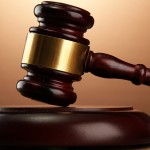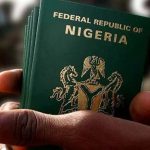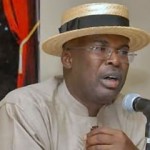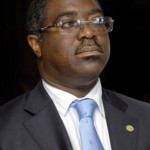Opinion: On Military Deployment At The Polls By Adewale Kupoluyi
Articles/Opinion, Latest Headlines Saturday, February 28th, 2015
A major issue dotting our political architecture is whether or not the military should be deployed to provide security at the polls. As accusations and counter-accusations continue to trail the proposal, there are insinuations that politicians are busy recruiting private armies and equipping them with weapons to unleash mayhem on real and perceived enemies, thus justifying military the deployment.
While the ruling party, Peoples Democratic Party (PDP) has supported the move, the All Progressives Congress (APC) and its presidential candidate, Major-Gen. Muhammadu Buhari, insist that the use of the military during elections is undemocratic because it is believed that soldiers have the tendency to violate fundamental human rights of the citizenry by scaring voters away from exercising their civic duty. An attempt by the APC to stop the Federal Government from using the military in conducting the general elections suffered a setback at the House of Representatives while the Senate President, Senator David Mark, also rejected the demand as well as an attempt at summoning the security chiefs and the National Security Adviser to explain their roles in the alleged interference with the operations of the Independent National Electoral Commission (INEC).
Then we need to ask these questions: Can’t the Nigeria Police enforce law and order during the forthcoming polls? Are the politicians and political parties kicking against the use of the military ready to obey the rule of law during and after the exercise, irrespective of the outcome? Those who criticise military deployment argued further that it will suppress voters’ independence, saying it’s an attempt at manipulating the process in favour of the ruling party while the supporters of military deployment also point to these two factors. First, the general insecurity in the country, most especially in the North-East, which exposes the lives of electoral officials and party agents to serious danger because of the Boko Haram insurgency that has been giving military authorities sleepless nights. Second, the possibility of rigging the polls through ballot snatching, thuggery and irregular movement of election materials. Advocates of deployment of the military have equally claimed that the President is empowered by law to deploy the military for operational purposes. Section 8 of the Armed Forces Act specifically states that the President shall have the power to deploy the armed forces. The then Action Congress of Nigeria (ACN) candidate in governorship election in Edo State, Comrade Adams Oshiomhole, once commended President Goodluck Jonathan on this saying, “what the Edo election has confirmed is that when the President and Commander-in-Chief puts the country first and he conducts himself as a statesman not just as a party leader, credible elections are possible. This is because people were apprehensive that the Nigerian Army could be misused. But of course, I told them I didn’t think they were right”.
In what could be described as a clear departure from this provision, Section 215 of the 1999 Constitution (As amended), states that the maintenance of internal security including law and order during elections shall be the duty of the Nigeria Police Force. Similarly, two different courts have also ruled that the Federal Government should desist from deploying the armed forces in the conduct of elections. A judgment delivered by Justice R. M. Aikawa of the Federal High Court in Sokoto, in the suit marked: FHC/S/CS/29/2014 among others, had restrained the President and INEC “from engaging the service of the Nigerian armed forces in the security supervision of elections in any manner whatsoever in any part of Nigeria, without the Act of the National Assembly”. Justice Abdul Aboki, in his lead judgment during the Ekiti State Governorship Election Appeal on February 16 also held that “the President of Nigeria has no powers to call on the Nigerian armed forces and to unleash them on peaceful citizens, who are exercising their franchise to elect their leaders”.
Despite the various interpretations given to this contentious deployment of soldiers, it is instructive to note that Section 218, which I feel has been misquoted to support the constitutional justification for military deployment at elections, is far from being an independent provision; it is rather qualified by Section 217, which clearly lays out the circumstances under which the Armed Forces can be lawfully deployed. These include the defence of the nation from external aggression, securing of the borders, maintenance of the territorial integrity and the suppression of insurrection with the collaboration of civil authorities in restoring order by the President and subject to such conditions as may be prescribed by an Act of the National Assembly. Such powers of the President as provided in Section 218(1) are qualified and clearly limited by Section 217(2) of the 1999 Constitution. As it is, INEC appears to have align itself with the position that encourages the deployment, as it had continuously re-iterated its resolve to use the military alongside the support rendered by the police and other security agencies. The Interagency Consultative Committee on Election Security was also established in 2011 in ensuring that the role of the military is limited to providing INEC with mere logistics support.
We recall the gory past of military excessiveness, when a few hours before the Osun election day, over 10,000 battle-ready soldiers were reportedly drafted to mount surveillance on all the roads leading to the state from the boundaries of the neighbouring Ekiti, Ondo, Kwara, Oyo and Ogun states, thereby putting the state under serious siege, resulting into untold hardship for the people occasioned by queues of parked vehicles and stretched long distances from entry points. Political opponents and supporters were said to have been brutalised and incarcerated. That is why international observers, party agents and civil societies group should be given the free-hand to monitor proceedings. The media, the Fourth Estate of the Realm, should be allowed to perform its societal obligation under a convivial atmosphere as the watchdog in deepening democracy. Openness remains the best way to enthroning democratic credentials. This will involve granting true independence to the electoral body to discharge its duties. The Nigeria Police Force should be better equipped with adequate funds, personnel and requisite training to carry out its statutory functions now being usurped by the army.
Military deployment is nothing but a subtle invitation for soldiers to supplant democracy. In the past, there had been reported cases of harassment and intimidation of civilians by soldiers. This is where the Federal Government should be very careful not to give the impression of taking sides and abusing state apparatus, thus fuelling the age-long fears that the military has been seriously politicised. In the past, soldiers have been accused of intimidating voters during elections. This should not be. Military operatives are not in anyway superior to the civilians. They are public servants and as such, are expected to respect civil rule and comport themselves in a submissive and dignified manner. They should carry out their duties with utmost patriotism. Nigerians should be watchful and shun violence in the face of any provocation. They should go about their normal business without fear.
Politicians should play the game by its rules bearing in mind that nobody gains anything by engaging in do-or-die politicking. Or, is political office no longer an avenue for service delivery? The planned military deployment – a clear defiance of court orders – may eventually not translate into victory for any party because the politicians may never be with the electorate at the point of vote casting to pick their preferred candidates. Candidates that could turn things around for the people and make the nation a better place. What should really matter most is the people’s unwavering resolution and strong-will to get the best, which the barrel of gun can never suppress.
Kupoluyi writes from Federal University of Agriculture, Abeokuta (FUNAAB), adewalekupoluyi@yahoo.co.uk, @AdewaleKupoluyi, www.adewalekupoluyi.blogspot.com
Related Posts
Short URL: https://www.africanexaminer.com/?p=22475






















